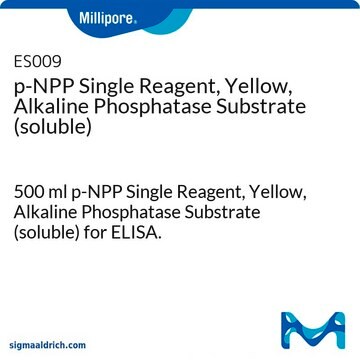487664
p-Nitrophenyl Phosphate Substrate Buffer
This p-Nitrophenyl Phosphate Substrate Buffer is validated for use in ELISA.
Autenticatiper visualizzare i prezzi riservati alla tua organizzazione & contrattuali
About This Item
Codice UNSPSC:
41116158
NACRES:
NA.77
Prodotti consigliati
Livello qualitativo
Sterilità
non-sterile
Forma fisica
liquid
Produttore/marchio commerciale
Calbiochem®
Condizioni di stoccaggio
OK to freeze
protect from light
Colore
clearlight yellow
Condizioni di spedizione
wet ice
Temperatura di conservazione
2-8°C
Categorie correlate
Descrizione generale
Alkaline phosphatase substrate buffer supplied as ready-to-use. A diluent for Cat. No. 487663.
This p-Nitrophenyl Phosphate Substrate Buffer is validated for use in ELISA.
Applicazioni
ELISA (see comments)
Azioni biochim/fisiol
Primary Target
Alkaline phosphatase substrate buffer
Alkaline phosphatase substrate buffer
Product does not compete with ATP.
Attenzione
Toxicity: Standard Handling (A)
Altre note
Product tested for stability at 4°C, 18-26°C, and 37°C. Product performance is tested on the final product by ELISA.
Suggested procedure for use of p-NPP in alkaline phosphatase-based ELISAs:
1. To 39 parts distilled water add 1 part 50X p-NPP Concentrate (Cat. No. 487663) and 10 parts p-NPP Substrate Buffer. Mix well and store protected from light. This diluted reagent is suitable for up to 10 h after preparation.
2. Complete all required incubations with antibodies and alkaline phosphatase-labeled probes.
3. Wash plate wells at least 4 times with Tris-buffered saline (TBS) containing 0.1% Tween®-20 detergent. DO NOT USE PHOSPHATE BUFFERS; inorganic phosphate is a potent inhibitor of alkaline phosphatase.
4. After the final wash, shake and blot all residual buffer from the wells.
5. Add 100 µl of 1X p-NPP Substrate Solution to each well and incubate for 15-60 min. (If a kinetic study is desired, readings at 405 nm may be taken at intermediate intervals).
[Note: Optimal incubation times may vary depending on the amount of enzyme present. If color develops too quickly, dilution of the probe, antibody, or alkaline phophatase-labeled reagent may be required.]
6. Stop the reaction by adding 100 µl of 1 N NaOH.
7. Read absorbance at 405 nm.
Note: Variations in time, reagent volumes, and temperature may require further standardization by the user.
Suggested procedure for use of p-NPP in alkaline phosphatase-based ELISAs:
1. To 39 parts distilled water add 1 part 50X p-NPP Concentrate (Cat. No. 487663) and 10 parts p-NPP Substrate Buffer. Mix well and store protected from light. This diluted reagent is suitable for up to 10 h after preparation.
2. Complete all required incubations with antibodies and alkaline phosphatase-labeled probes.
3. Wash plate wells at least 4 times with Tris-buffered saline (TBS) containing 0.1% Tween®-20 detergent. DO NOT USE PHOSPHATE BUFFERS; inorganic phosphate is a potent inhibitor of alkaline phosphatase.
4. After the final wash, shake and blot all residual buffer from the wells.
5. Add 100 µl of 1X p-NPP Substrate Solution to each well and incubate for 15-60 min. (If a kinetic study is desired, readings at 405 nm may be taken at intermediate intervals).
[Note: Optimal incubation times may vary depending on the amount of enzyme present. If color develops too quickly, dilution of the probe, antibody, or alkaline phophatase-labeled reagent may be required.]
6. Stop the reaction by adding 100 µl of 1 N NaOH.
7. Read absorbance at 405 nm.
Note: Variations in time, reagent volumes, and temperature may require further standardization by the user.
Note legali
CALBIOCHEM is a registered trademark of Merck KGaA, Darmstadt, Germany
TWEEN is a registered trademark of Croda International PLC
Avvertenze
Danger
Indicazioni di pericolo
Consigli di prudenza
Classi di pericolo
Eye Dam. 1 - Repr. 2 - Skin Irrit. 2
Codice della classe di stoccaggio
12 - Non Combustible Liquids
Classe di pericolosità dell'acqua (WGK)
WGK 2
Punto d’infiammabilità (°F)
Not applicable
Punto d’infiammabilità (°C)
Not applicable
Certificati d'analisi (COA)
Cerca il Certificati d'analisi (COA) digitando il numero di lotto/batch corrispondente. I numeri di lotto o di batch sono stampati sull'etichetta dei prodotti dopo la parola ‘Lotto’ o ‘Batch’.
Possiedi già questo prodotto?
I documenti relativi ai prodotti acquistati recentemente sono disponibili nell’Archivio dei documenti.
I clienti hanno visto anche
Il team dei nostri ricercatori vanta grande esperienza in tutte le aree della ricerca quali Life Science, scienza dei materiali, sintesi chimica, cromatografia, discipline analitiche, ecc..
Contatta l'Assistenza Tecnica.















